“We are open to just about anything... I am all for writing anything that sounds like a cavalcade of horses!” Trevor de Brauw and Laurent Schroeder-Lebec are crafting an epic journey, one riff at a time, as Pelican's original lineup takes flight again
Flickering Resonance is the first Pelican album since the return of Schroeder-Lebec, and it finds the Chicago post-metal institution's sound on an evolutionary path to destinations unknown
![Pelican's Trevor de Brauw [left] and Laurent Schroeder-Lebec perform at Hellfest 2022. De Brauw plays his Gibson SG. Schroeder-Lebec is playing his Silverburst Gibson Les Paul Custom.](https://cdn.mos.cms.futurecdn.net/j8UmVEqqLoYaooWjde6UEL.jpg)
Flickering Resonance, the latest studio long-player from Chicago-based post-metal instrumentalists Pelican, is an invitation to turn your mind loose for a while, to unshackle it from the here and now and surrender it to a creative force that feels somehow elemental, summoned from the natural world.
Since evolving out of the avant-garde grindcore project Tusk in 2000, initially as a side-project, Pelican has displayed a gift for transmuting the often ugly raw materials of underground metal and hardcore, sludge, rock or whatever, into something more reflective, redemptive and – okay – at times kind of beautiful.
What was their epic 2003 debut, Australasia, if not an exercise in beautifying the super-heavy?
Like many Hydra Head bands of that era – e.g. Torche proving that sludge could be pop – Pelican reinterpreted heavy, guitarists Trevor de Brauw and Laurent Schroeder-Lebec applying the muscle of low-end electric guitar to undulating melodies and grooves that felt as inevitable as the tide.
Their sound has evolved in the two decades following their debut – there’s less repetition, more dynamics – but now, as it was back then, Flickering Resonance puts pictures in your mind, each song and the sections within it acting as a scene change.
“We certainly aim for the music to be evocative, and we like to think of it as a space where we can breathe in positivity and connection, and feel our humanity,” says Schroeder-Lebec. “Especially in an increasingly dystopian and fragmented times, it is nice to have a creative space where you can align with your friends and paint a picture.”
Especially in an increasingly dystopian and fragmented times, it is nice to have a creative space where you can align with your friends and paint a picture
Laurent Schroeder-Lebec
Flickering Resonance is the first Pelican album with Schroeder-Lebec since he returned to the band in 2022, a 10-year absence in which he worked in hospitality and raised a family. But in all that time, the working relationship between he and de Brauw hasn’t changed all that much. Pelican has its own vocabulary for how they transition from one part to the next, from light to dark.
Want all the hottest music and gear news, reviews, deals, features and more, direct to your inbox? Sign up here.
“I think it’s purely feel. I don’t really know if we’re utilising too much technical language to get there,” says Schroeder-Lebec. “Sometimes it is lacking the technical term, like, ‘You know when we go from the thing to the thing? We kind of need a little thing in-between to make that happen.’”
De Brauw bursts out in laughter at this. He knows it sounds preposterous but he knows exactly what Schroeder-Lebec means – and what he meant at the time.
All of us have our eccentricities of how we hear music and how we perform music
Trevor de Brauw
“Our process has always been quite intuitive,” he says. “Obviously, there is a shared language that we have developed over time by virtue of playing together, but all of us have our eccentricities of how we hear music and how we perform music, and like Laurent said, just being together for so long, and playing together for so long, in so many different contexts, we have an intuitive sense of how each person is going to relate to any given part.
“So if I hear Laurent playing a riff, I might intuitively understand how Larry [Herweg, drums] is going to interpret it when he hears it, and how that will fit into a broader structure.”
Flickering Resonance was recorded at Narwhal Studios, in Chicago. Sanford Parker, who produced Australasia and has been a long-time studio collaborator, returned to record the album. Parker agrees that Pelican in 2025 is more dynamic.
Even he can’t help but reference natural forces when talking about the evolution of their sound. “Early on, it was all about crushing your skull with volume,” said Parker, speaking to Decibel. “Now it’s more about crafting a journey, creating ebbs and flows, ups and downs. They have grown as musicians and songwriters for sure, perfecting the art of dynamics.”
After trying all the pedals they could get their hands on in search of a tone epiphany, de Brauw admits they ended up back where they started with their usual rigs – de Brauw on his ’72 Gibson SG, Schroeder-Lebec on his Les Paul Custom. Pelican’s music chases down the horizon but it all emanates from the same place. Old habits die hard.
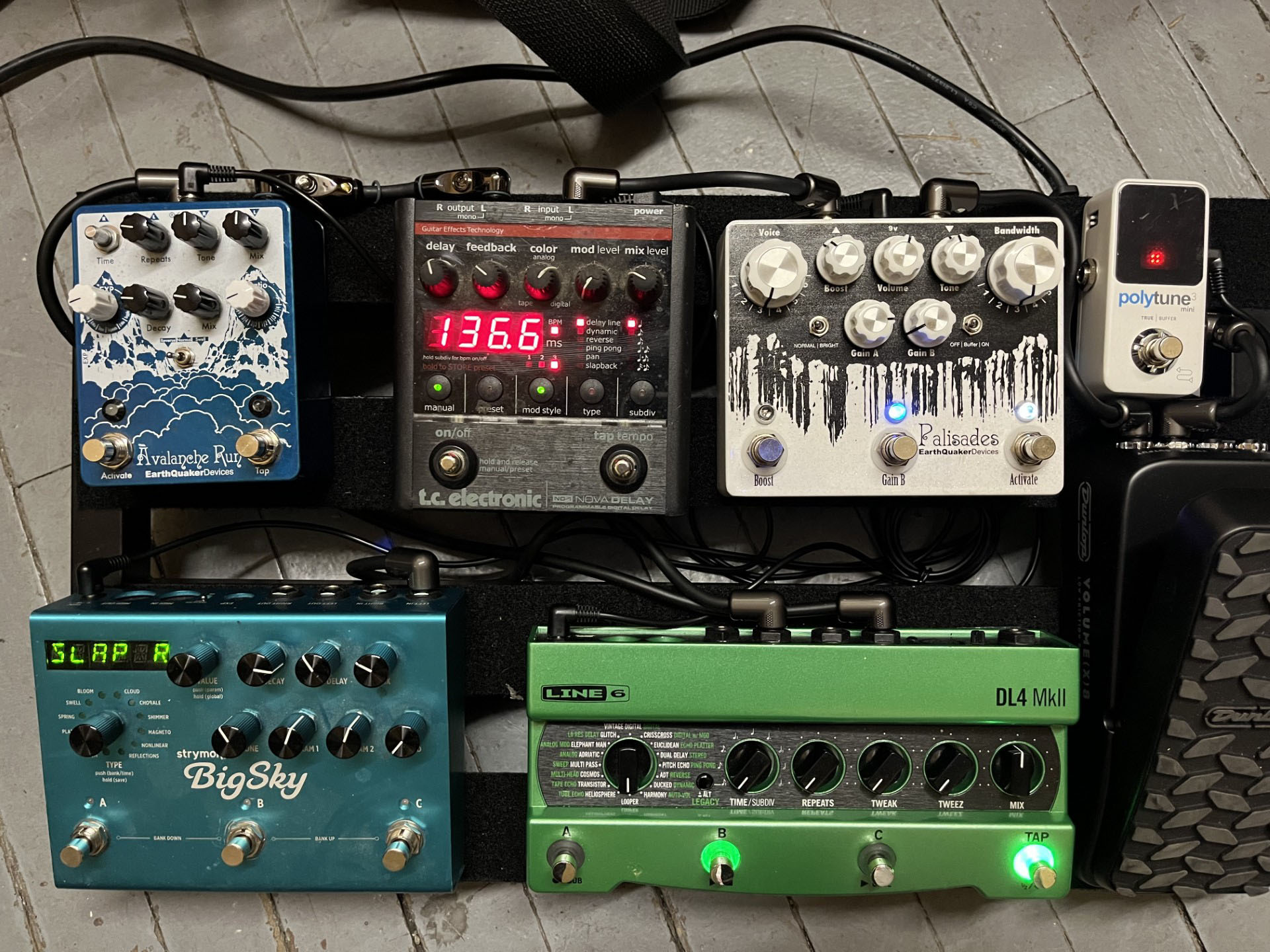
De Brauw’s Palisades overdrive pedal is all over the recording, pushing his amp. His other pedalboard choices are all about building a sense of space and depth. There is a super-powerful TC Electronic ND-1 Nova Delay, an EarthQuaker Devices Avalanche Run stereo reverb/delay, an industry standard Line 6 DL4 MKII multi delay pedal, and a Strymon BigSky reverb pedal.
Gulch came from wanting to do a Smashing Pumpkins, little glaze-y kind of riff but then by the time some of the harmonies came into it it went to a completely different place
Laurent Schroeder-Lebec
Schroeder-Lebec’ has more gain options on his ‘board, with Wata from Boris’ signature fuzz pedal from EarthQuaker Devices, an Elk BM Sustainar clone called Hizumitas, joined by a Revv G2 preamp/overdrive and an Orange Two Stroke boost.
He has also got a Boss RE-2 Space Echo, a Boss CE-2W chorus pedal, a JHS Kodiak tremolo pedal, some BBD-style analogue delay emulation courtesy of a Strymon Brigadier, and a Strymon BlueSky for reverb.
There are some gnarly sounds, not just from the guitars. Brian Herweg’s bass guitar tone on Indelible, which calls to mind Adam Yauch circa Check Your Head, but it soon yield to something more ecstatic, mellowing out. If there were any harsh frequencies on tape, Scott Evans (Kowloon Walled City) smoothed them out in the mix.
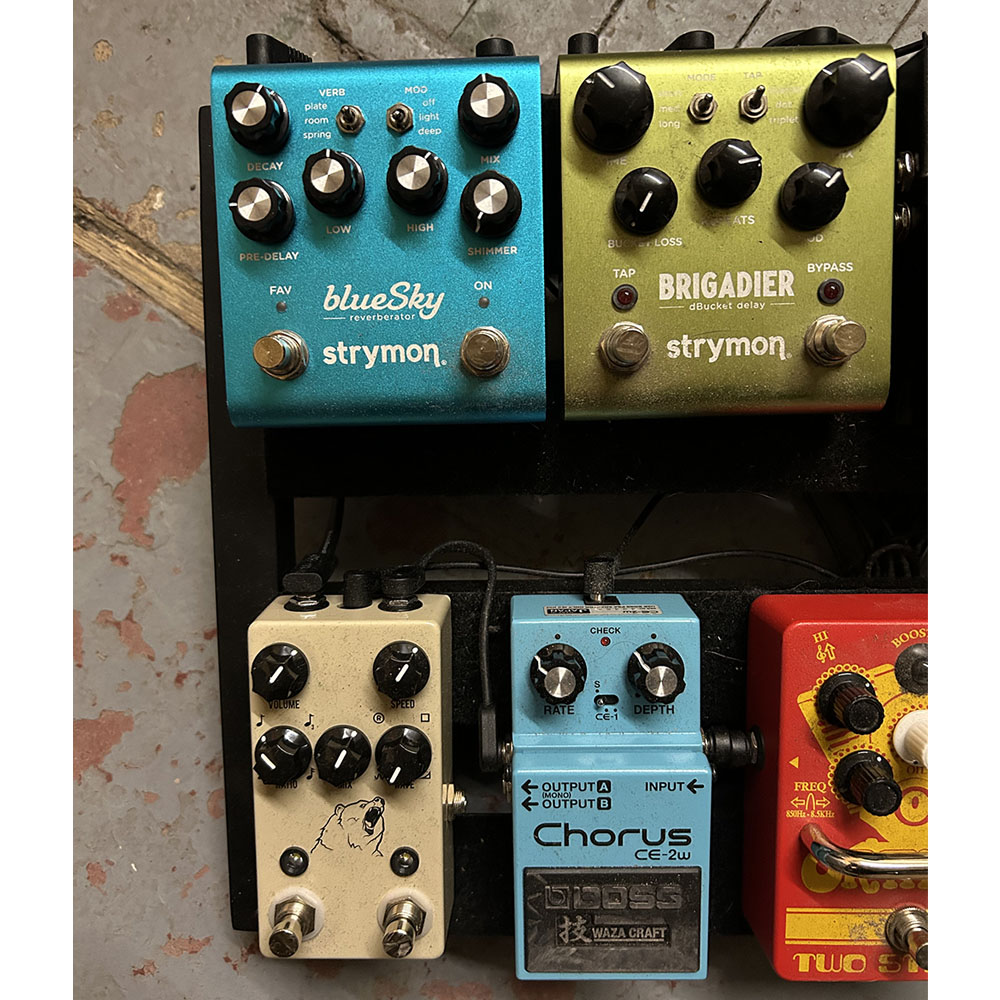
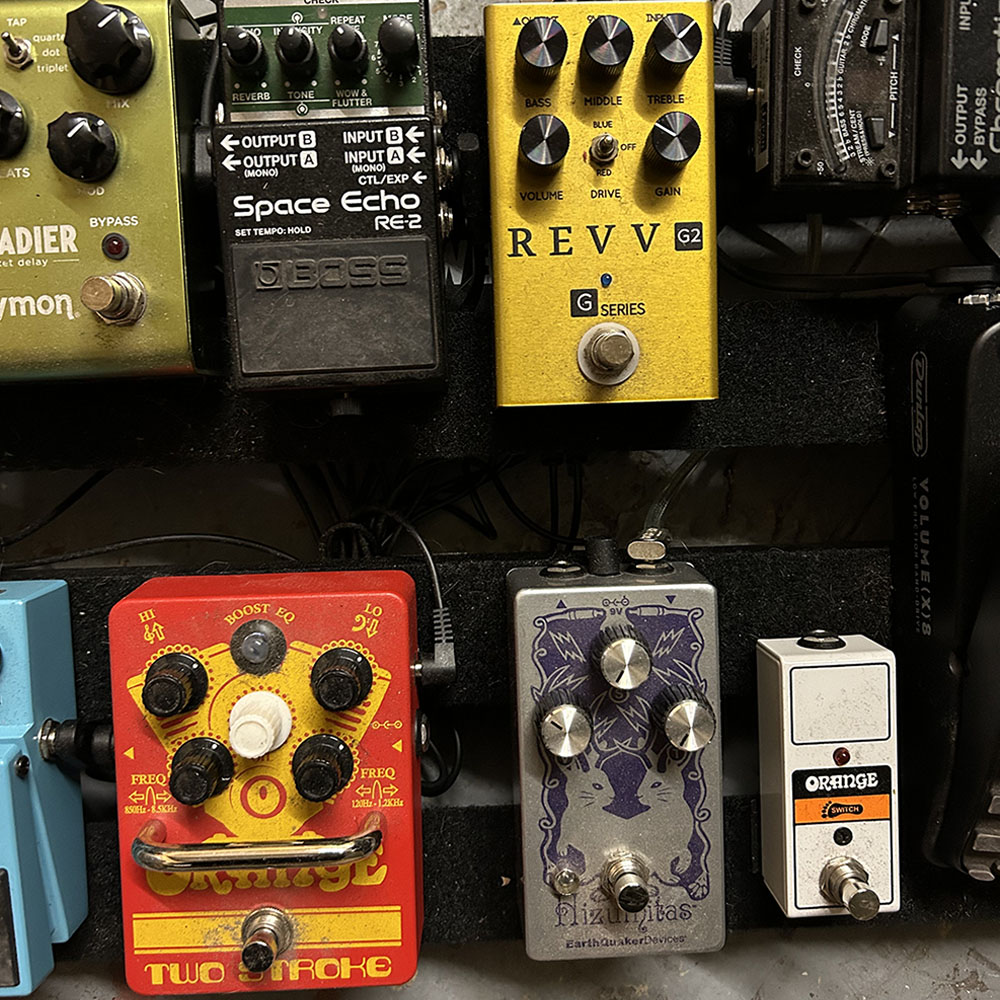
Opening an album with a track titled Gulch is as explicit as Pelican get when it comes to evoking the vastness of nature. Choose your own scene. It could be Clint Eastwood on horseback through the Carbon Canyon we see in Pale Rider, something out of Cormac McCarthy’s Border Trilogy, the Swiss Alps. But the inspiration was closer to home.
“In the context of Gulch, it came from wanting to do a Smashing Pumpkins, little glaze-y kind of riff,” says Schroeder-Lebec. “But then by the time some of the harmonies came into it it went to a completely different place.”
You can hear what he means about the Smashing Pumpkins vibe, that sort of loose-leaf slacker sound of Rocket – but there’s almost a sort of Mixolydian folk-ish feel to it, too.
“If you are telling me that Richard Thompson would like the music that we are doing, or like Fairport Convention, I would be all about it!” says Schroeder-Lebec. “Yeah, you draw influences from so many different things, and over the two decades of us listening to music together and talking about music, we are open to just about anything. So who knows what pops up when it does.
If you are telling me that Richard Thompson would like the music that we are doing, or like Fairport Convention, I would be all about it!
Laurent Schroeder-Lebec
“It’s interesting to hear it in the context of folk modalities because I can sort of hear it in my head now. I’m like, ‘Actually, it does have a little bit of that happening.’ It just goes to show; music is such a porous place to be if you allow it to be. You can draw influence from all sorts of different things.”
There have been occasions when you will hear a vocalist on a Pelican track. Right now you could grab yourself a limited edition seven-inch pressing of Cascading Crescent that has been released with Geoff Rickly (ex-Thursday) on vocals. But it’s a rare event, probably a Saturn in retrograde, solar eclipse kind of deal.
Flickering Resonance says it all without lyrics, and maybe it is a function of being instrumental that Pelican are a little more free to wander out from the shadow of the verse/chorus structure and follow their musical curiosity to see where it takes them. Cascading Crescent opens and makes you think Goatsnake – that riff – but it ends up somewhere completely different.
“Yeah, that song, Brian had the opening riff,” says Schroeder-Lebec. “He was like, ‘This is something I had left over.’ I went back, tooled up a couple of parts that could go alongside that, and I remember when we first started to work on it, it was almost like a song where we are like, ‘Oh it will be fun to come up with it but I am not really sure where it will go.’ Because it does go back to that sort of earlier [Pelican] sound.
“The more we played the song, the more little nuances started to pop up, and by the time we had structured it fully, it turned out to be one of the songs we were enjoying the most, especially in the context of playing it live. It really found its place. It’s an interesting way that a song can start as one thing, where you are not sure where it will go, but by the time you get finished with it you are quite attached to it.”
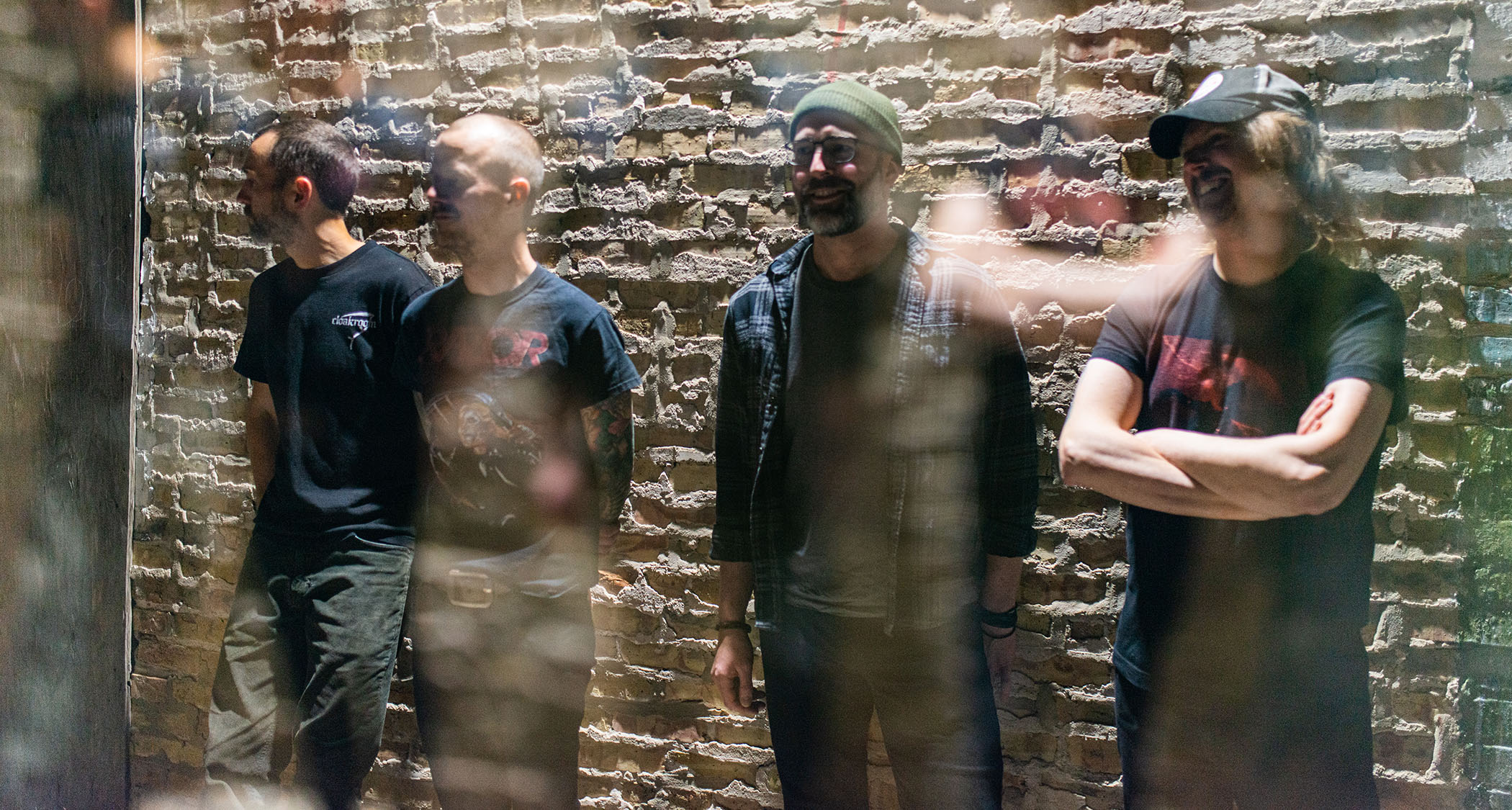
Songwriting is an art-form that relies on a certain element of trust. You have to trust the audience to fill in the blanks. Or you have to withhold that trust and just lay it everything out on the line, engineer it like a pop song, make it explicitly clear what’s going on.
But again, with no vocals, you’ve only got song-titles and cover art to plant the suggestion. When Pelican started writing for this, they had no had no pictures in their head to work with.
“We listen for what the emotion is that is being conveyed by any given part that comes up onto the grid, and then we try to figure out where that emotion wants to go naturally,” says de Brauw. “We let it chart its own path that we then follow. I guess in that sense it is sorta like jazz but it doesn’t really sound similar, and I don’t think the processes are similar.”
Jazz is all quick changes and lightning movement. The moving parts on a Pelican record are probably too cumbersome to be handled like this. They carry a load.
Take Indelible, the weight of the riff, and that blissful vibe. They are written by instinct but shepherded along by patience and an intuited momentum. Jazz is like a rodeo. Pelican is like driving a cavalcade of horses across the plain.
“I am all for writing anything that sounds like a cavalcade of horses,” says Schroeder-Lebec.
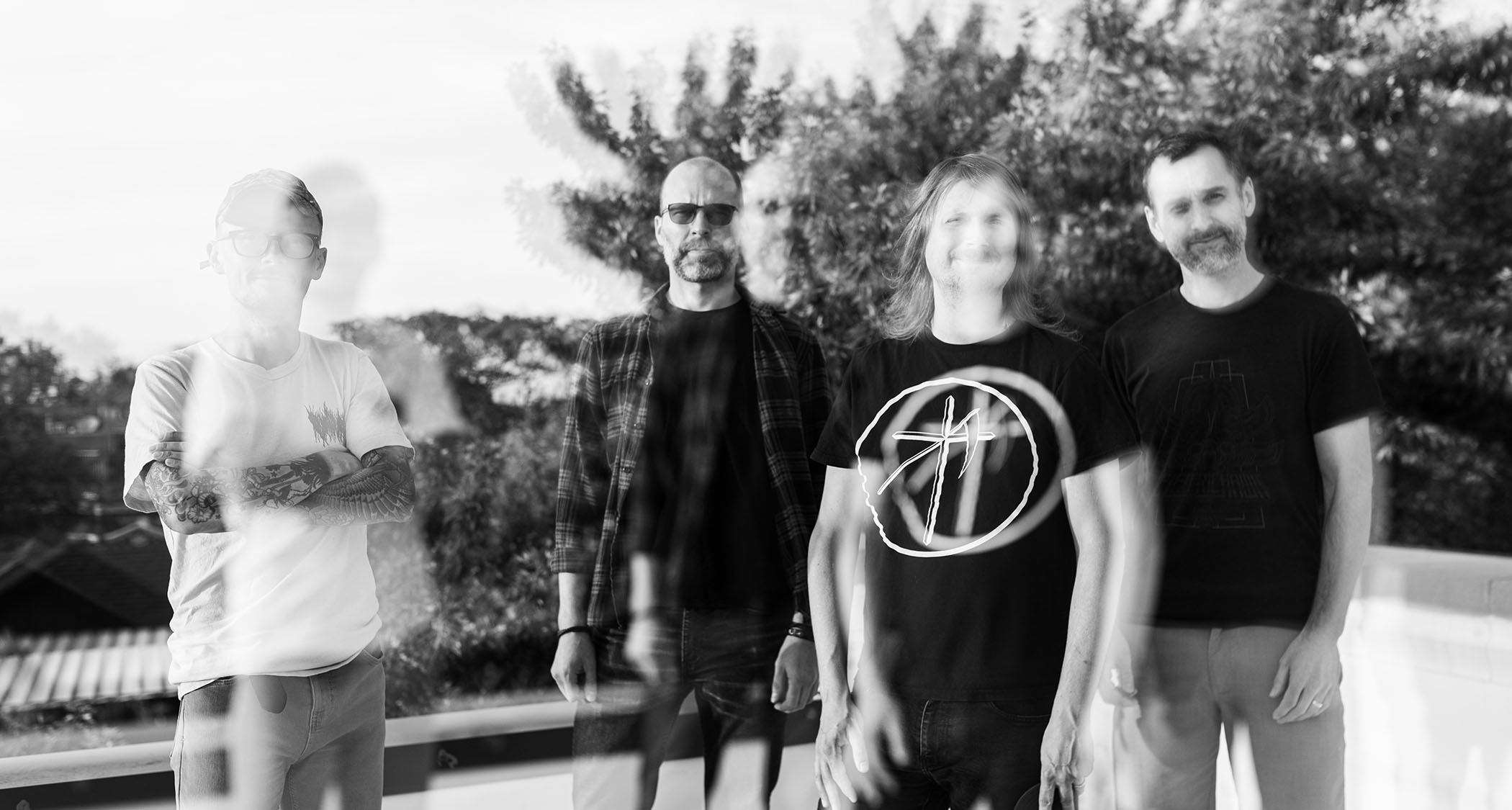
“We are just not content sitting still,” adds de Brauw. “In the old days, we were very good at doing repetition until a part had been drilled into the ground, but at some point, after years of touring, we became restless, and now it’s like, yeah, we introduce subtle evolutions in the riff, maybe not every single riff but we want it to continue to evolve over the course of a song.
“I think that gives the song a forward momentum, so it feels like you’re on some kind of journey. You said a cavalcade! It’s all of that. Trying to figure out the path, and trying to figure out where it wants to go, and just letting it lead us there.”
To where, it doesn’t really matter. It’s like what they say about travel – and long-distance running – being transcendent in and of itself, the act of movement itself taking us towards some spiritual epiphany. The journey is the destination.
- Flickering Resonance is out now via Run For Cover. Pelican is on tour across the US July and plays ArcTanGent in the UK in August. See Pelican for dates and tickets.
Jonathan Horsley has been writing about guitars and guitar culture since 2005, playing them since 1990, and regularly contributes to MusicRadar, Total Guitar and Guitar World. He uses Jazz III nylon picks, 10s during the week, 9s at the weekend, and shamefully still struggles with rhythm figure one of Van Halen’s Panama.
You must confirm your public display name before commenting
Please logout and then login again, you will then be prompted to enter your display name.






